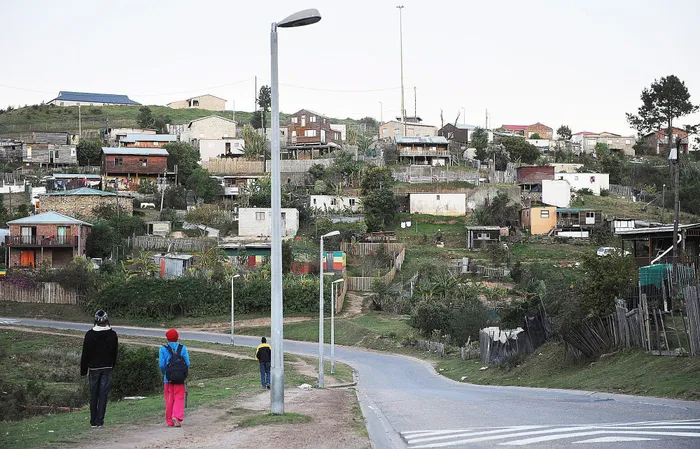Cost of living crisis driving people around the bend: ‘Now it’s survival of the luckiest’

Specialist psychiatrist at Mediclinic Legae Hospital in Mabopane, Dr Thabo Mogotlane, said at least 30% of South African township residents exhibit symptoms of depression, while around 25% are affected by anxiety disorders. File picture: Independent Newspapers
Cape Town - The stress of crime, gun violence, rising unemployment, and food insecurity have seen a surge in mental health issues in townships across the country.
This week’s figures released by StatsSA showing an increase in the unemployment rate, added further fuel to the fire of the cost-of-living crisis, stressing families struggling to put food on their tables.
Specialist psychiatrist at Mediclinic Legae Hospital in Mabopane, Dr Thabo Mogotlane, said at least 30% of South African township residents exhibit symptoms of depression, while around 25% are affected by anxiety disorders.
The rate of post-traumatic stress disorder (PTSD) is also estimated to be around 15% to 20%, while around 10% to 15% of this population group suffer from substance abuse.
“The underlying causes of these worsening conditions are closely linked to the unique socio-economic challenges faced by people living in these communities. Some of these causes can be attributed to the alarmingly high level of unemployment, which currently stands at just under 33%.
“High levels of crime can also be linked to the deterioration of mental health. South Africa currently has a crime index of 75.4, which, despite its decrease in recent years, is still the highest crime index on the continent.
“Due to vast levels of under servicing, the rise of gangsterism and increasing levels of violence, crime conditions in townships are particularly acute. These major social issues play a crucial role in shaping the overall well-being and mental health struggles experienced by people who live in townships.
“To this point, the SA Human Rights Commission has established a direct link between poverty and child and adolescent mental health, with this producing far-reaching effects into adulthood.”
According to the Quarterly Labour Force Survey, the official unemployment rate was 33.5% in Q2 this year. There was a decrease of 92 000 in the number of employed to 16,7 million. This, while there was an increase of 158 000 in the number of unemployed to 8.4 million compared to Q1 this year.
Bongile Zanazo, who lives in the Covid-19 informal settlement in Mfuleni, said unemployment was what was driving many people to depression.
“Being in an environment where a lot of people aren’t working, you can’t have anything because people will come to you and ask for help. Unemployment is the sister to poverty and brother to crime. Employed people get robbed by the same people they live with. It’s difficult to live a normal life.
“People talk about survival of the fittest; now it’s survival of the luckiest. The cost of living is too high. And people end up breaking the law. In Covid-19, the reason for mob justice is unemployment. The thieves would steal and come back to the same society to sell.”
He said in most cases people didn’t know how they were going to survive.
“It’s crazy, because you don't know how you’re going to survive, because of the challenges. That is why people go and drink even if it’s low quality alcohol.
“That affects the way we do things and our behaviour. There are people who end up selling their bodies and souls because they want to go to bed with something in their stomachs.
“Some of the people have families to feed. Even the millions of jobs announced by the government, they are never close to your community.
“There is no insult worse than unemployment. I blame myself everyday when I know that I have to buy my kids things. That is why most men are depressed; it is enough to drive you crazy and to crime.”
The Cape Crime Crisis Coalition founder, Llewellyn MacMaster, said children were being robbed from an opportunity to dream, “to develop their God-given gifts and talents, and are being offered on the altars of corrupt officials and politicians, as well as unscrupulous criminals (gang bosses and drug lords) for their selfish interests”.
“This affects children in a myriad of ways on all levels of their lives and development – psychological, social, educational, sexual. Violence has become so normalised and institutionalised that it has become extremely difficult to convince them that there are other forms of conflict resolution.
“They are not helped or counselled to deal with their hurt and trauma and it just lies there under the surface. Hurt/damaged people hurt people. We are a wounded nation. Not everyone can afford to take their children out of these situations.
“The youth unemployment is extremely high and there is a lack of recreation and sporting facilities. We have not succeeded in eradicating the negative effects of apartheid with the majority of people still suffering in squalid conditions in township. In too many instances the circumstances are even worse, through lack of service delivery and mismanagement.”
MacMaster added that in the 1980s, during the anti-apartheid struggle for liberation, healthcare professionals coined the term "collective trauma syndrome" to encapsulate the political and social realities of civil conflict. Individuals faced continuous life-threatening events in their daily lives.
“Therefore, referring solely to PTSD is insufficient. PTSD assumes that traumatic stress or psychological distress results from a single incident or limited exposure to violence.”
mandilakhe.tshwete@inl.co.za
Related Topics: